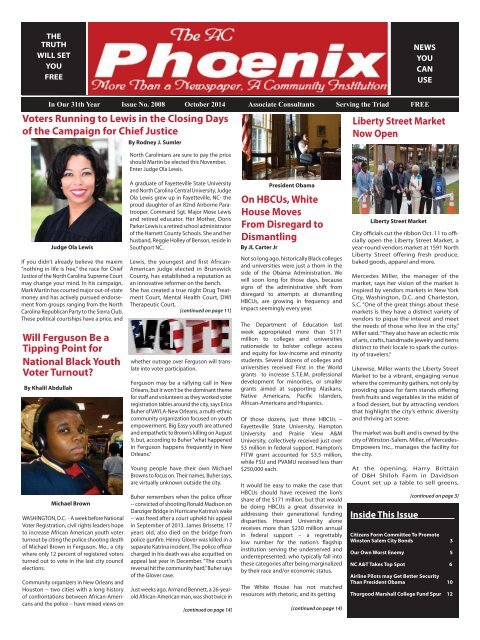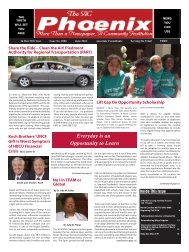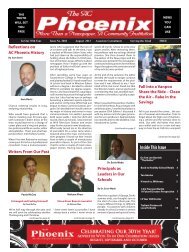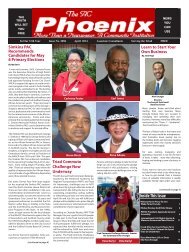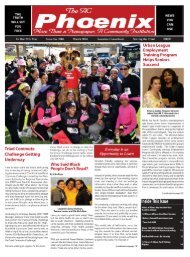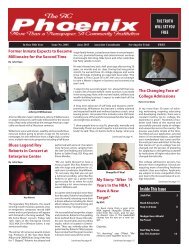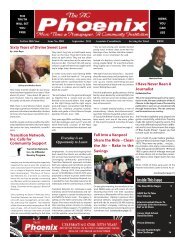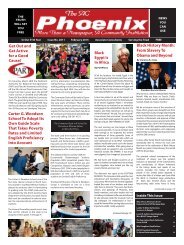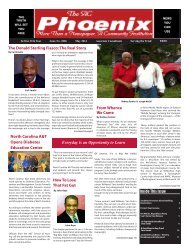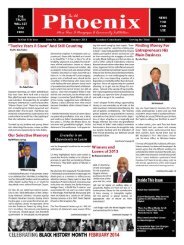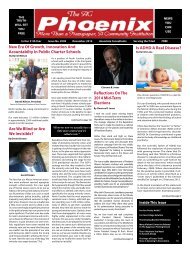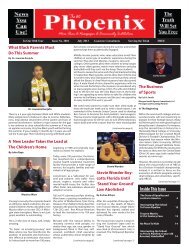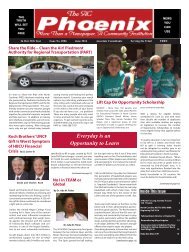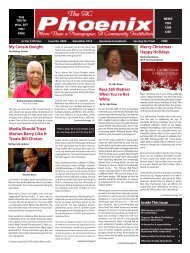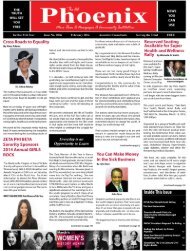The AC Phoenix: More than a Newspaper, a Community Institution -- Issue No. 2016, October 2014
Voters Running to Lewis in the Closing Days of the Campaign for Chief Justice, by Rodney J. Sumler On HBCUs, White House Moves from Disregard to Dismantling, by JL Carter Jr Liberty Street Market Now Open Will Ferguson be a Tipping Point for National Black Youth Voter Turnout? By Khalil Abdullah Also Inside This Issue: Citizens Form Committee to Promote Winston Salem City Bonds Our Own Worst Enemy NC A&T Takes Top Spot Airline Pilots may get Better Security than President Obama Thurgood Marshall College Fund Spur
Voters Running to Lewis in the Closing Days of the Campaign for Chief Justice, by Rodney J. Sumler
On HBCUs, White House Moves from Disregard to Dismantling, by JL Carter Jr
Liberty Street Market Now Open
Will Ferguson be a Tipping Point for National Black Youth Voter Turnout? By Khalil Abdullah
Also Inside This Issue:
Citizens Form Committee to Promote Winston Salem City Bonds
Our Own Worst Enemy
NC A&T Takes Top Spot
Airline Pilots may get Better Security than President Obama
Thurgood Marshall College Fund Spur
Create successful ePaper yourself
Turn your PDF publications into a flip-book with our unique Google optimized e-Paper software.
THE<br />
TRUTH<br />
WILL SET<br />
YOU<br />
FREE<br />
NEWS<br />
YOU<br />
CAN<br />
USE<br />
In Our 31th Year <strong>Issue</strong> <strong>No</strong>. 2008 <strong>October</strong> <strong>2014</strong> Associate Consultants Serving the Triad FREE<br />
Voters Running to Lewis in the Closing Days<br />
of the Campaign for Chief Justice<br />
By Rodney J. Sumler<br />
<strong>No</strong>rth Carolinians are sure to pay the price<br />
should Martin be elected this <strong>No</strong>vember.<br />
Enter Judge Ola Lewis.<br />
Liberty Street Market<br />
<strong>No</strong>w Open<br />
Judge Ola Lewis<br />
If you didn’t already believe the maxim<br />
“nothing in life is free,” the race for Chief<br />
Justice of the <strong>No</strong>rth Carolina Supreme Court<br />
may change your mind. In his campaign,<br />
Mark Martin has courted major out-of-state<br />
money and has actively pursued endorsement<br />
from groups ranging from the <strong>No</strong>rth<br />
Carolina Republican Party to the Sierra Club.<br />
<strong>The</strong>se political courtships have a price, and<br />
Will Ferguson Be a<br />
Tipping Point for<br />
National Black Youth<br />
Voter Turnout?<br />
By Khalil Abdullah<br />
Michael Brown<br />
WASHINGTON, D.C. - A week before National<br />
Voter Registration, civil rights leaders hope<br />
to increase African American youth voter<br />
turnout by citing the police shooting death<br />
of Michael Brown in Ferguson, Mo., a city<br />
where only 12 percent of registered voters<br />
turned out to vote in the last city council<br />
elections.<br />
<strong>Community</strong> organizers in New Orleans and<br />
Houston -- two cities with a long history<br />
of confrontations between African-Americans<br />
and the police -- have mixed views on<br />
A graduate of Fayetteville State University<br />
and <strong>No</strong>rth Carolina Central University, Judge<br />
Ola Lewis grew up in Fayetteville, NC- the<br />
proud daughter of an 82nd Airborne Paratrooper,<br />
Command Sgt. Major Mose Lewis<br />
and retired educator. Her Mother, Doris<br />
Parker Lewis is a retired school administrator<br />
of the Harnett County Schools. She and her<br />
husband, Reggie Holley of Benson, reside in<br />
Southport NC.<br />
Lewis, the youngest and first African-<br />
American judge elected in Brunswick<br />
County, has established a reputation as<br />
an innovative reformer on the bench.<br />
She has created a true night Drug Treatment<br />
Court, Mental Health Court, DWI<br />
<strong>The</strong>rapeutic Court,<br />
[continued on page 11]<br />
whether outrage over Ferguson will translate<br />
into voter participation.<br />
Ferguson may be a rallying call in New<br />
Orleans, but it won’t be the dominant theme<br />
for staff and volunteers as they worked voter<br />
registration tables around the city, says Erica<br />
Buher of VAYLA-New Orleans, a multi-ethnic<br />
community organization focused on youth<br />
empowerment. Big Easy youth are attuned<br />
and empathetic to Brown’s killing on August<br />
9, but, according to Buher “what happened<br />
in Ferguson happens frequently in New<br />
Orleans.”<br />
Young people have their own Michael<br />
Browns to focus on. <strong>The</strong>ir names, Buher says,<br />
are virtually unknown outside the city.<br />
Buher remembers when the police officer<br />
-- convicted of shooting Ronald Madison on<br />
Danziger Bridge in Hurricane Katrina’s wake<br />
-- was freed after a court upheld his appeal<br />
in September of 2013. James Brissette, 17<br />
years old, also died on the bridge from<br />
police gunfire. Henry Glover was killed in a<br />
separate Katrina incident. <strong>The</strong> police officer<br />
charged in his death was also acquitted on<br />
appeal last year in December. “<strong>The</strong> court’s<br />
reversal hit the community hard,” Buher says<br />
of the Glover case.<br />
Just weeks ago, Armand Bennett, a 26-yearold<br />
African-American man, was shot twice in<br />
[continued on page 14]<br />
On HBCUs, White<br />
House Moves<br />
From Disregard to<br />
Dismantling<br />
By JL Carter Jr<br />
President Obama<br />
<strong>No</strong>t so long ago, historically Black colleges<br />
and universities were just a thorn in the<br />
side of the Obama Administration. We<br />
will soon long for those days, because<br />
signs of the administrative shift from<br />
disregard to attempts at dismantling<br />
HBCUs, are growing in frequency and<br />
impact seemingly every year.<br />
<strong>The</strong> Department of Education last<br />
week appropriated more <strong>than</strong> $171<br />
million to colleges and universities<br />
nationwide to bolster college access<br />
and equity for low-income and minority<br />
students. Several dozens of colleges and<br />
universities received First in the World<br />
grants to increase S.T.E.M. professional<br />
development for minorities, or smaller<br />
grants aimed at supporting Alaskans,<br />
Native Americans, Pacific Islanders,<br />
African-Americans and Hispanics.<br />
Of those dozens, just three HBCUs –<br />
Fayetteville State University, Hampton<br />
University and Prairie View A&M<br />
University, collectively received just over<br />
$3 million in federal support. Hampton’s<br />
FITW grant accounted for $3.5 million,<br />
while FSU and PVAMU received less <strong>than</strong><br />
$250,000 each.<br />
It would be easy to make the case that<br />
HBCUs should have received the lion’s<br />
share of the $171 million, but that would<br />
be doing HBCUs a great disservice in<br />
addressing their generational funding<br />
disparities. Howard University alone<br />
receives more <strong>than</strong> $230 million annual<br />
in federal support – a regrettably<br />
low number for the nation’s flagship<br />
institution serving the underserved and<br />
underrepresented, who typically fall into<br />
these categories after being marginalized<br />
by their race and/or economic status.<br />
<strong>The</strong> White House has not matched<br />
resources with rhetoric, and its getting<br />
[continued on page 14)<br />
Liberty Street Market<br />
City officials cut the ribbon Oct. 11 to officially<br />
open the Liberty Street Market, a<br />
year-round vendors market at 1591 <strong>No</strong>rth<br />
Liberty Street offering fresh produce,<br />
baked goods, apparel and more.<br />
Mercedes Miller, the manager of the<br />
market, says her vision of the market is<br />
inspired by vendors markets in New York<br />
City, Washington, D.C. and Charleston,<br />
S.C. “One of the great things about these<br />
markets is they have a distinct variety of<br />
vendors to pique the interest and meet<br />
the needs of those who live in the city,”<br />
Miller said. “<strong>The</strong>y also have an eclectic mix<br />
of arts, crafts, handmade jewelry and items<br />
distinct to their locale to spark the curiosity<br />
of travelers.”<br />
Likewise, Miller wants the Liberty Street<br />
Market to be a vibrant, engaging venue<br />
where the community gathers, not only by<br />
providing space for farm stands offering<br />
fresh fruits and vegetables in the midst of<br />
a food dessert, but by attracting vendors<br />
that highlight the city’s ethnic diversity<br />
and thriving art scene.<br />
<strong>The</strong> market was built and is owned by the<br />
city of Winston-Salem. Miller, of Mercedes-<br />
Empowers Inc., manages the facility for<br />
the city.<br />
At the opening, Harry Brittain<br />
of D&H Shiloh Farm in Davidson<br />
Count set up a table to sell greens,<br />
Inside This <strong>Issue</strong><br />
[continued on page 3]<br />
Citizens Form Committee To Promote<br />
Winston Salem City Bonds 3<br />
Our Own Worst Enemy 5<br />
NC A&T Takes Top Spot 6<br />
Airline Pilots may Get Better Security<br />
Than President Obama 10<br />
Thurgood Marshall College Fund Spur 12
Page 2 <strong>October</strong> <strong>2014</strong> <strong>The</strong> <strong>AC</strong> <strong>Phoenix</strong>
Page 3 <strong>October</strong> <strong>2014</strong> <strong>The</strong> <strong>AC</strong> <strong>Phoenix</strong><br />
Fall Into a Vanpool<br />
Share the Ride –<br />
Clean the Air – Rake<br />
in the Savings<br />
Fall is just around the corner…the season<br />
of renewal and relaxation. Time to forget<br />
about the high cost of maintaining a<br />
vehicle and the stressful drive to work.<br />
Out with old habits that drain your wallet<br />
and on to a new and easy way to clean the<br />
air. Fall into a vanpool!<br />
<strong>The</strong> Piedmont Authority for Regional<br />
Transportation offers 7 and 15-Passenger<br />
vans to commuters who live at least 10<br />
miles from their workplace and agree to<br />
share the ride. Riders pay one low monthly<br />
fare which includes the cost of maintenance,<br />
insurance, gas and a guaranteed<br />
emergency ride home. Drivers typically<br />
ride for free!<br />
Vanpoolers meet at a specified location,<br />
Liberty Street Market<br />
<strong>No</strong>w Open<br />
[continued from page 1]<br />
usually a free PART Park and Ride lot, park<br />
their personal vehicles and board the van<br />
to head to work. Once the work day is<br />
complete, they return back to the Park<br />
& Ride lot. It’s that simple! PART leases<br />
vans to groups who either live or work<br />
in member counties of Alamance, Davie,<br />
Davidson, Forsyth, Guilford, Randolph,<br />
Rockingham, Stokes, Surry or Yadkin. A<br />
driver and at least five commuters are<br />
required to start a new vanpool. PART can<br />
also assist in getting riders for the vanpool.<br />
With Fall upon us, now is the time to start<br />
preparing for the holidays. Vanpooling is<br />
a great way to save money and make the<br />
work commute easier! For as little as $50<br />
per month, you too could enjoy improved<br />
personal time management and reduced<br />
insurance premiums.<br />
If you are interested in joining or starting<br />
a new vanpool, contact PART at<br />
1-800-588-7787 or by visiting the website:<br />
www.partnc.org.<br />
Citizens Form<br />
Committee to<br />
Promote Winston-<br />
Salem City Bonds<br />
Co-Chairs of Forward Together<br />
Winston-Salem Committee Are<br />
Named<br />
Winston-Salem, NC – Forward Together<br />
Winston-Salem announced today it will<br />
lead the effort for passage of the five<br />
community improvement bonds that<br />
will appear on the city ballot this fall.<br />
Co-chairing the committee are community<br />
volunteers Steve Strawsburg, Sarah<br />
Smith and Walteria Spaulding.<br />
According to the most recent estimate,<br />
the City of Winston-Salem faces more<br />
<strong>than</strong> $709 million in capital projects<br />
that current revenues are insufficient to<br />
fund. <strong>The</strong> five separate bonds totaling<br />
$139 million, reflect the priorities set by<br />
city council, input from residents during<br />
public meetings and recommendations<br />
of a volunteer citizen committee that<br />
reviewed the city’s needs in 2011.<br />
“<strong>No</strong> matter where someone lives in the<br />
city, they will benefit from these bonds,”<br />
says Mrs. Spaulding, committee cochair<br />
and a community volunteer. “<strong>The</strong><br />
projects to be funded are prioritized by<br />
urgency of need and include improvements<br />
to roads, parks and greenways,<br />
sidewalks, housing, public safety and<br />
job creation all across the city.<br />
<strong>The</strong> bonds will provide funding for:<br />
young professionals who have moved<br />
to Winston-Salem after college and<br />
now call it home.. “So for many of the<br />
younger residents like myself, this is our<br />
chance to shape the future of our city<br />
and make an impact in a very visible way<br />
to preserve the quality of life in Winston-<br />
Salem.”<br />
Currently, Winston-Salem has the lowest<br />
debt per capita of <strong>No</strong>rth Carolina’s five<br />
largest cities - roughly 60 percent less<br />
<strong>than</strong> Charlotte and 40 percent less <strong>than</strong><br />
Greensboro. <strong>The</strong> city also has the lowest<br />
combined taxes and fees of any of the<br />
state’s major cities. In fact, in three of the<br />
last four property revaluations, the city<br />
actually has lowered the tax rate.<br />
Additionally, while Winston-Salem’s<br />
population has increased by nearly<br />
50,000 residents, the city has the same<br />
number of employees today as it did<br />
in 2001.<br />
“With interest rates low, now is the most<br />
affordable time to issue bonds,” says Mr.<br />
Strawsburg, committee co-chair and<br />
community volunteer. “If voters approve<br />
all five bonds, there will be a 2.5 cent<br />
increase in the city tax rate. This means<br />
the owner of an average-price home,<br />
approximately $127,000, would pay $32<br />
more a year. That equates to about 9<br />
cents a day.”<br />
“<strong>The</strong>se bonds are not just about Winston-Salem<br />
keeping up with other cities,”<br />
says Strawsburg. “It’s about addressing<br />
our most pressing needs and investing<br />
in the future. It’s about our ability to<br />
continue to provide job opportunities,<br />
safe streets and neighborhoods and a<br />
quality of life all across our city that lives<br />
up to our reputation as the city of arts<br />
and innovation.”<br />
Over the coming weeks, the committee<br />
plans a public information campaign to<br />
make sure residents know how important<br />
the bonds are to the city’s future.<br />
For more information about Forward<br />
Together Winston-Salem, go to Winston-<br />
SalemBonds.com.<br />
sweet potatoes, turnips and other produce<br />
from the 15 acres of vegetables he<br />
farms south of Arcadia. “We don’t sell<br />
anything we don’t grow,” he said.<br />
Elsewhere, Ardella Fuiell-Salimia, affectionately<br />
known as “<strong>The</strong> Bean Lady,”<br />
offered<br />
exotic, dried heirloom beans. “My mission<br />
is to bring something different to<br />
the table,” she said. To inspire her customers,<br />
most days she also sells something<br />
she prepared with her products,<br />
be it “Tiger Eye” chili, hummus, or homemade<br />
cake made from scratch with her<br />
beans.<br />
Matthew Berry set up a table selling<br />
odds & ends, ranging from handbags to<br />
Winston-Salem State T-shirts, to accessories<br />
such as belts and table computer<br />
covers. Berry said he was drawn by<br />
the market’s location, “and the people<br />
involved.”<br />
“<strong>The</strong>y’re nice people,” he said, “and I’d<br />
“<strong>The</strong>y’re nice people,” he said, “and I’d<br />
like to make some money for them, and<br />
some money for me, and help the community.”<br />
<strong>The</strong> market is open Thursdays through<br />
Saturdays from 8 a.m. to 3 p.m. In addition,<br />
and to help establish the market as<br />
a place for the entire community, Miller<br />
will be opening it up every first Sunday<br />
of the month from 10 a.m. to 4 p.m. for<br />
a community yard sale, starting <strong>No</strong>v. 1.<br />
Also, Miller said, “Many non-profit organizations,<br />
churches and civic groups<br />
have inquired about using the space for<br />
their fundraisers and private events. It is<br />
indeed a great location for these types<br />
of events and causes.”<br />
Spaces are available at the Liberty Street<br />
Market. For guidelines, applications and<br />
additional information please contact<br />
Terrance McNeil at (336) 793-3441 or lsvm@<br />
earthlink.net. Internships and volunteer<br />
opportunities are available.<br />
<br />
sites to attract and retain jobs<br />
<br />
and fire facilities<br />
<br />
and recreational facilities<br />
<br />
struction<br />
and neighborhood improvements<br />
ways<br />
and pedestrian safety improvements<br />
Since 2000, <strong>No</strong>rth Carolina’s four other<br />
large cities (Greensboro, Charlotte,<br />
Durham & Raleigh) have approved 13<br />
bond issues for more <strong>than</strong> $1.2 billion.<br />
“It’s been 14 years since Winston-Salem’s<br />
last bond referendum,” says Ms. Smith,<br />
committee co-chair and one of many
Page 4 <strong>October</strong> <strong>2014</strong> <strong>The</strong> <strong>AC</strong> <strong>Phoenix</strong>
Page 5 <strong>October</strong> <strong>2014</strong> <strong>The</strong> <strong>AC</strong> <strong>Phoenix</strong><br />
Obama’s tone to this group of Blacks was<br />
extremely condescending? <strong>The</strong>y both<br />
showed a great deal of disdain for their<br />
own people. <strong>No</strong>w just suppose that a<br />
White Democrat had said the same thing.<br />
<strong>The</strong>se very same Blacks would have lost<br />
their minds screaming bloody racism.<br />
With Fudge and Obama it may not be<br />
racism, but it is liberal elitism at its finest.<br />
Fudge claims that the CBC is fighting for<br />
Blacks even when they won’t fight for<br />
themselves. Really? How is supporting<br />
amnesty for illegals helping the Black<br />
community? Every analysis done has<br />
concluded that amnesty would drastically<br />
increase the Black unemployment rate.<br />
How is denying poor mothers the power<br />
to choose which schools to send their<br />
kids to helping better the lives of those<br />
forced to attend subpar schools? I find it<br />
ironic that most CBC members refuse to<br />
send their kids to public schools. <strong>The</strong>re<br />
are more Americans on food stamps<br />
now <strong>than</strong> at any point in our country’s<br />
history and Blacks are disproportionately<br />
represented in this number.<br />
a deaf ear to their White consultants who<br />
constantly tell them that the Black vote is<br />
unattainable? Just food for thought.<br />
_________________<br />
Raynard Jackson is president & CEO of<br />
Raynard Jackson & Associates, LLC., a<br />
Washington, D.C.-based public relations/<br />
government affairs firm.<br />
<strong>No</strong>rth Carolina<br />
Central Receives<br />
$897K to Fight<br />
Juvenile HIV<br />
Infection<br />
By JL Carter Sr<br />
Our Own Worst<br />
Enemy<br />
By Raynard Jackson<br />
Raynard Jackson<br />
Black Democrats are the most despised<br />
people on the face of this earth and they<br />
have worked hard to deserve this designation.<br />
<strong>The</strong>y vote upwards of 90 percent for<br />
Democratic candidates for president and<br />
get very little in exchange for their loyalty.<br />
<strong>The</strong>y constantly deliver victory to Democrats,<br />
only to see the spoils of victory go<br />
to other groups: homosexuals, illegals,<br />
and White women.<br />
Jimmy Carter had very few Blacks in<br />
his administration. Bill Clinton had<br />
more, but threw Lani Guinier, one of<br />
his closest personal friends and a top<br />
campaign supporter, under the bus<br />
because of threats by Republicans not<br />
to confirm her as Assistant Attorney<br />
General. Obama has even refused<br />
to interview a Black female jurist for<br />
consideration to the U.S. Supreme Court.<br />
So, I was thoroughly stunned by the<br />
comments of the Democratic chairman<br />
of the Congressional Black Caucus (CBC),<br />
Marcia Fudge (D-Ohio) during their annual<br />
conference two weeks ago here in DC.<br />
Here is a direct quote from her: “I hope<br />
you will spend this much time with your<br />
local elected officials. I guarantee you<br />
most people in this room have not done<br />
that. With your school board, with your<br />
city council, and so then you won’t be<br />
calling me talking about somebody didn’t<br />
come and pick up your trash. You need<br />
to call your city council person for that.<br />
And I say it that way because, I need<br />
you to understand we all have a role to<br />
play and the Congressional Black Caucus<br />
cannot do it all by ourselves. Everybody<br />
has to do their part …<strong>The</strong> black caucus<br />
fights for you every day. Even when you<br />
won’t fight for yourself. We fight for you.<br />
Whether its immigration or education,<br />
whether it’s food stamps or housing, we<br />
fight for you every day. So my message to<br />
you is to contain your complaining.”<br />
<strong>No</strong>w mind you, the CBC is the same group<br />
that criticized Obama for telling them to<br />
stop complaining at their annual dinner<br />
in September of 2011, “Take off your<br />
bedroom slippers. Put on your marching<br />
shoes; Shake it off. Stop complainin’.<br />
Stop grumblin’. Stop cryin’. We are<br />
going to press on. We have work to do.”<br />
Isn’t it amazing that both Fudge and<br />
According to the U.S. Department of<br />
Agriculture, in the past five years, the<br />
number of households on food stamps<br />
has greatly increased. In fiscal year 2009<br />
– Oct. 1, 2008 through Sept. 30, 2009<br />
— the number of households on food<br />
stamps was 15,232,115. Five years later, in<br />
2013, that amount had increased by 51.3<br />
percent to reach 23,052,388 households<br />
(or 20 percent of all households). Twenty<br />
two percent of Blacks receive food stamps<br />
during this time period, though Blacks<br />
are 13 percent of the U.S. population.<br />
How does the CBC expect Blacks to be<br />
able to afford to buy a home, if they are<br />
promoting policies that continue to keep<br />
the unemployment rate at high levels?<br />
Fudge and the CBC seem to talk about<br />
fighting for welfare as though it should<br />
be a badge of honor. Would it not make<br />
more sense to brag about how their<br />
policies are increasing employment<br />
opportunities for Blacks, therefore those<br />
needing food stamps is going down. That<br />
would be worth celebrating.<br />
If Republicans would take this message<br />
into the Black community, not only will we<br />
take over the Senate; but we will win the<br />
White House with double digit support<br />
from the Black community. Would this<br />
not be a “conservative” approach to<br />
dealing with some of the issues affecting<br />
the Black community? Would this not be<br />
a worthy expenditure of campaign funds?<br />
<strong>The</strong> Black vote is up for grabs during this<br />
congressional election and beyond. <strong>The</strong><br />
question for Republicans is who will turn<br />
Researchers at <strong>No</strong>rth Carolina Central<br />
University’s Juvenile Justice Institute<br />
were recently awarded a three-year,<br />
$897,000 grant by the US Department of<br />
Health and Human Services to combat<br />
substance abuse and the spread of HIV<br />
among young adults.<br />
<strong>The</strong> grant will raise awareness of health<br />
risks associated with drug and alcohol<br />
abuse, and their links to the transmission<br />
of HIV among 18 to 24 year olds. <strong>The</strong><br />
grant follows similar programs at HBCUs<br />
nationwide, including Morgan State University<br />
and Bowie State University.<br />
<strong>The</strong> collaborative effort recognizes the<br />
close interaction of the campus population<br />
with the larger Durham community,<br />
said Arnold Dennis, executive director of<br />
the Juvenile Justice Institute.<br />
“If we can begin to deal with preventing<br />
substance abuse and reducing the<br />
transmission of HIV using the wealth of<br />
knowledge we have from our behavior<br />
and social science faculty, we can work<br />
towards making sure that our students<br />
and the surrounding community will not<br />
be pulled into these addictive and harmful<br />
behaviors,” Dennis said.
Page 6 <strong>October</strong> <strong>2014</strong> <strong>The</strong> <strong>AC</strong> <strong>Phoenix</strong><br />
Avoiding the<br />
Freshman 15 Can<br />
Have Long-Term<br />
Health Benefits<br />
By Dr. Michele C. Reed<br />
Recently, thousands of African-American<br />
students started college for the first<br />
time and lots of big changes are headed<br />
their way. Life away from home includes<br />
a whole host of new responsibilities like<br />
arriving to class on time, getting good<br />
grades, meal planning on a limited budget<br />
and the list goes on.<br />
One of the biggest challenges during this<br />
time is avoiding the “Freshman 15” - the<br />
amount of weight college students are<br />
said to gain in their first year. Obesity is<br />
a critical issue in the African-American<br />
community, especially for women. Making<br />
unbalanced food choices might taste<br />
good for a moment but can lead to a<br />
long-term struggle with weight. Choices<br />
made during this time can put students<br />
on the road to a healthy and active future<br />
or lead them on a path to bad health.<br />
Here are a few tips for eating and exercising<br />
that will set your student up for success.<br />
Mini-Size the Mini-Fridge<br />
<strong>The</strong> mini-fridge has limited space and so<br />
does the dorm room. Mini-size popular<br />
food and drink items to fit in the fridge<br />
(and diet). A few options like fruit cups,<br />
small bottles of water, jars of soup, cups<br />
of yogurt, Coca-Cola mini cans of soda<br />
and others can help keep off the extra<br />
pounds.<br />
Buddy Up<br />
Grab girlfriends, frat brothers or new<br />
roommates and get moving! Set a time<br />
each night to work out together, take the<br />
long way to the dining hall or join a fitness<br />
class at the student center. Having<br />
an accountability partner to go on the<br />
health journey with can help keep things<br />
on track .<br />
###<br />
Dr. Michele C. Reed is a Board Certified<br />
Family Medicine Physician in the Long Island,<br />
New York area. Her expert opinion<br />
has been featured in many publications<br />
including Ebony Magazine, Heart & Soul<br />
Magazine, the New York Daily News and<br />
others. She is also a consultant to food<br />
and beverage companies like Coca-Cola.<br />
<strong>More</strong> insights from Dr. Reed can be found<br />
at www.askdrmichele.com.<br />
<strong>No</strong>rth Carolina A&T<br />
Takes Top Spot as<br />
Nation’s Largest<br />
HBCU<br />
By JL Carter Sr<br />
<strong>No</strong>rth Carolina A&T Takes Top Spot<br />
as Nation’s Largest HBCU<br />
With more <strong>than</strong> 10,700 students enrolled<br />
this fall, <strong>No</strong>rth Carolina A&T State University<br />
has taken the top spot as the nation’s<br />
largest HBCU by student enrollment.<br />
<strong>The</strong> Greensboro News and Record yesterday<br />
reported on the Aggies’ latest accolade,<br />
which places the university 200<br />
students ahead of Howard University and<br />
more <strong>than</strong> 500 ahead of Florida A&M University,<br />
the perennial title holder.<br />
University officials attributed A&T’s enrollment<br />
jump, about 1.6 percent over the<br />
last year, to a focus on recruiting transfer<br />
students and undergraduate retention<br />
strategies.<br />
“It doesn’t serve you well if you bring<br />
them in one door and send them out the<br />
other,” said Akua Matherson, the university’s<br />
associate vice chancellor of enrollment<br />
management.<br />
Don’t Skip Breakfast<br />
Breakfast is the most important meal of<br />
the day. If in a rush, grab a piece of fruit,<br />
cereal, oatmeal or a handful of nuts (keep<br />
a breakfast option in the room). Or get up<br />
a little early and stop by the dining hall<br />
for a bite to eat. Eating breakfast gets the<br />
metabolism going and helps curb hunger<br />
and overeating later on in the day.<br />
Take the Long Way<br />
Get more exercise by going the long way<br />
to and from class or walking or riding<br />
your bike instead of taking the bus. Also,<br />
find the gym or recreation center on your<br />
campus where using weights and cardio<br />
equipment is usually free.<br />
Eat Fruits & Veggies<br />
Yes, eating fruits and veggies while away<br />
at college is still required. While they<br />
probably don’t have Big Mama’s collard<br />
greens or green bean casserole, the dining<br />
hall has great options. Add veggies to<br />
an omelet or pizza or grab a few pieces of<br />
fruit from the dining hall for the room or<br />
backpack.
Page 7 <strong>October</strong> <strong>2014</strong> <strong>The</strong> <strong>AC</strong> <strong>Phoenix</strong><br />
4 Most Common<br />
Choking Hazards<br />
By William Spriggs<br />
Truth is, anyone can choke, even adults<br />
who have been eating solid foods for<br />
decades. Here’s how to play it safe and<br />
prevent choking.<br />
Remember the first time you fed your pintsized<br />
grandchild grapes or hot dogs? You<br />
were probably politely told by your son<br />
or daughter to cut these foods into tiny<br />
pieces, so the child wouldn’t choke.<br />
But don’t mistake choking as a hazard just<br />
for the toddler set.<br />
Truth is, anyone can choke, even adults<br />
who have been eating solid food for six<br />
decades. According to the National Safety<br />
Council, choking is the third leading cause<br />
of death in American homes, with foods<br />
being the primary culprit.<br />
“You can really choke on anything,” says<br />
Joan Salge Blake, R.D., a clinical associate<br />
professor of nutrition at Boston University<br />
and media spokesperson for the American<br />
Academy of Nutrition and Dietetics. “You<br />
have to be sure you chew properly and not<br />
swallow in big gulps. It’s also important to<br />
have fluids on hand, so you can swallow<br />
and move things along.”<br />
Alcohol increases your risk. When you<br />
do drink, make sure to keep your alcohol<br />
intake to a minimum, says Sharon A.<br />
Brangman, M.D., professor of medicine<br />
and division chief of geriatric medicine<br />
in at Upstate Medical Center in Syracuse,<br />
N.Y. “Drinking alcohol can reduce your<br />
judgment and increase your choking risk,”<br />
she says. “Talking while you’re eating also<br />
raises your risk.”<br />
Since the way you eat your food has as<br />
much to do with your odds of choking as<br />
what you eat, it’s important to pay attention<br />
to both your habits and your food<br />
choices. Here are the scenarios that can<br />
put you at risk for choking and the foods<br />
most likely to trip you up:<br />
Choking Hazards<br />
<strong>No</strong>shing by the Handful<br />
It’s easy – so easy – to grab that fistful of<br />
buttery popcorn at the movies, or that<br />
scoop of nuts at the party, especially when<br />
you’re hungry. But putting too much food<br />
into your mouth at once can up the odds<br />
of choking. “Foods that people tend to eat<br />
by the handful can easily get overloaded<br />
in the mouth and aspirated, Brangman<br />
says. Common culprits include nuts, popcorn<br />
and grapes.<br />
A Matter of Size<br />
Some foods are problematic because of<br />
their size. Foods with small diameters that<br />
fit easily into the windpipe can create a<br />
plug, which will block airflow, Brangman<br />
says. Foods that can easily get lodged in<br />
your throat include hot dogs, grapes, and<br />
carrots and require careful attention to<br />
chewing.<br />
Texture Troubles<br />
Certain textures in food can be hazardous,<br />
especially if they’re chewy, dry or viscous.<br />
Edibles with these kinds of textures don’t<br />
go down easily and may require small bites<br />
and extra fluids. Some of the most texturally<br />
challenging foods include bagels,<br />
peanut butter, overcooked chicken, and<br />
thick, Dutch pretzels.<br />
Big Bites<br />
It’s tempting to eat hearty bites of certain<br />
foods, especially when you’re tired and<br />
hungry, and the food looks and smells<br />
delicious. “I once read that many men try<br />
to eat steak about the size of a pack of<br />
cigarettes,” Brangmas says. But don’t take<br />
in more <strong>than</strong> you can chew. Foods that<br />
often garner a big bite include steaks and<br />
stacked sandwiches.<br />
What to Do If You Choke When You’re<br />
Alone<br />
Let’s say you take all precautions, and<br />
you still find yourself choking and in a<br />
panic, there are a few different steps you<br />
can take. In an article for Prevention.com,<br />
Travis Stork, M.D., an ER physician cohost<br />
of TV’s <strong>The</strong> Doctors, and the author of<br />
<strong>The</strong> Lean Belly Prescription, says your first<br />
line of defense is coughing, something<br />
your body does automatically when your<br />
airway becomes blocked. Another strategy<br />
is to call attention to your plight by<br />
making whatever ruckus you can — it’s<br />
possible someone will hear and come to<br />
your aid.<br />
<strong>The</strong> Mayo Clinic and most health professionals,<br />
including Dr. Stork, recommend<br />
self-administering the Heimlich maneuver:<br />
Make a fist. Place the thumb below your<br />
rib cage and above your navel. Grasp<br />
your fist with your other hand. Press it into<br />
the area with a quick upward movement.<br />
You can also lean over a table edge, chair,<br />
or railing. Quickly thrust your upper belly<br />
area (upper abdomen) against the edge.<br />
Building Partnerships<br />
Between<br />
Police Officers and<br />
the Communities<br />
<strong>The</strong>y Serve<br />
By Ben Jealous<br />
Ben Jealous<br />
What is community policing? In the<br />
wake of increased shootings in Ferguson<br />
and around the country, there has<br />
been a renewed public interest in the<br />
role of police, the extent of police brutality,<br />
and the prevalence of racial bias.<br />
<strong>The</strong>se are not new issues, and in fact<br />
a number of organizations have been<br />
working for decades to increase trust<br />
between law enforcement and the<br />
communities they serve. Among these<br />
is the National Coalition Building Institute<br />
(NCBI), a nonprofit leadership program<br />
headquartered in Washington DC,<br />
whose leaders I spoke with recently.<br />
Founded in 1984, NCBI focuses on<br />
eliminating prejudice and resolving<br />
inter-group conflict. <strong>The</strong>y work in cities<br />
across the U.S. and overseas to build<br />
the capacity of local leaders in schools,<br />
college campuses, police departments,<br />
and environmental organizations to<br />
lead prevention-oriented workshops<br />
and to intervene in the face of tough<br />
inter group conflict. One of NCBI’s key<br />
programs, the Law Enforcement <strong>Community</strong><br />
Citizen Project, focuses on building<br />
productive relationships between<br />
police and the communities they serve.<br />
<strong>The</strong> NCBI Law Enforcement <strong>Community</strong><br />
Citizen Project was initially funded in<br />
2002 by a grant from the COPS office<br />
(the office of <strong>Community</strong> Policing at<br />
the US Department of Justice) to work<br />
in Bethlehem, PA and King County,<br />
WA. Since then the program has been<br />
implemented in Atlantic City, NJ as well<br />
as numerous communities throughout<br />
Pennsylvania, Missoula, MO, and Seattle,<br />
WA.<br />
NCBI is called on to bridge the divide<br />
between community members and<br />
police officers. NCBI leads Train the<br />
Trainer programs, Welcoming Diversity<br />
and Inclusion Workshops, and Leadership<br />
Institutes for officers and community<br />
activists to educate them in skills to<br />
foster cooperative relationships. Some<br />
communities have contacted NCBI<br />
when there have been specific difficulties<br />
between white police officers and<br />
people or neighborhoods of color that<br />
have been singled out by police. From<br />
their experience, NCBI has learned that<br />
it is best to offer communities a prevention-oriented,<br />
trust building approach.<br />
This way, NCBI builds the ongoing capacity<br />
of law enforcement and community<br />
activists to work in partnership to increase<br />
safety for all citizens in the community.<br />
I spoke with Fabienne Brooks, who along<br />
with Guillermo Lopez is co-director of<br />
NCBI’s Law Enforcement Program. Brooks<br />
is a retired Chief of Detectives for the King<br />
County Police Department in Seattle, WA.<br />
She was the first Black female officer in<br />
county history to be hired as a deputy,<br />
and throughout her career she made a<br />
point to immerse herself in the community<br />
that she served. <strong>The</strong> neighborhood<br />
she patrolled was the same neighborhood<br />
where she attended church and raised her<br />
family. After 26 years on the job, she retired<br />
and joined NCBI so she could continue her<br />
passion for community policing.<br />
Ms. Brooks told me that “an important<br />
part of community policing occurs when<br />
an officer recognizes that they are part<br />
of a community, and the community<br />
understands the same about the officer. It<br />
includes forming empathetic relationships<br />
between law enforcement and community<br />
members, which results in increased<br />
officer safety and safety for all members of<br />
the community.”<br />
<strong>The</strong> NCBI Law Enforcement <strong>Community</strong><br />
Partnership project builds trust between<br />
law enforcement and community leaders<br />
by helping each side to understand<br />
the daily realities of the other. Each has<br />
a key story to tell. Each deserves respectful<br />
listening. By teaching listening skills<br />
and conflict resolution practices and by<br />
helping each side see the humanity and<br />
legitimate concerns of the other, trust<br />
and partnership increases. In addition,<br />
NCBI teaches specific skill sets that help<br />
each side to confront the biases they have<br />
learned about each other that get in the<br />
way of equitable treatment of the entire<br />
community-- particularly the equitable<br />
treatment of people from different racial<br />
groups. NCBI believes in practices that will<br />
bring about institutional change not onetime<br />
trainings or quick fixes.<br />
As just one example of the outcomes of<br />
the NCBI’s COPS and <strong>Community</strong> project,<br />
consider what happened in Bethlehem,<br />
Pennsylvania. In 2005, a pool frequented<br />
by Latino young people had been closed<br />
for repairs and the young people went to<br />
another pool. Within minutes, the mainly<br />
white life guards felt threatened by the<br />
presence of the Latino young people,<br />
called the police and the police, ignoring<br />
the pleas of the Latino parents for calm,<br />
called for increased back up.<br />
A huge altercation between the parents<br />
and the police continued for months. <strong>The</strong><br />
NCBI trained police/ community activist<br />
team was able to bring the parents and<br />
police together, and using their NCBI skills,<br />
bring about increased trust and understanding.<br />
In Ferguson, Former Chief Brooks sees an<br />
opportunity for an effective communitypolicing<br />
program to emerge from the<br />
chaos and violence of the past few<br />
weeks.<br />
[continued on page 11]
Page 8 <strong>October</strong> <strong>2014</strong> <strong>The</strong> <strong>AC</strong> <strong>Phoenix</strong>
Page 9 <strong>October</strong> <strong>2014</strong> <strong>The</strong> <strong>AC</strong> <strong>Phoenix</strong><br />
<strong>More</strong> <strong>than</strong> $3 billion for education<br />
over the last eight years. That’s right.<br />
Together, <strong>No</strong>rth Carolinians have added<br />
classrooms, funded Pre-K programs,<br />
sent kids to college and kept teachers<br />
teaching. This year alone, more <strong>than</strong><br />
half a billion dollars was contributed<br />
to the $11 billion NC education budget.<br />
To see what the money has done in<br />
your community, visit<br />
WeAllDidThis.com.<br />
Must be 18 to play.
Page 10 <strong>October</strong> <strong>2014</strong> <strong>The</strong> <strong>AC</strong> <strong>Phoenix</strong><br />
Airline Pilots May<br />
Get Better<br />
Security Than<br />
President Obama<br />
By Hazel Trice Edney<br />
He described it as a “dagger”. That was<br />
the word used by a Transportation<br />
Security Administration (TSA) supervisor<br />
at Reagan National Airport Dec. 6 to<br />
describe a six-inch metal letter opener<br />
with a razor sharp tip at the end of a<br />
three-inch blade.<br />
“This could be used as a dagger,”<br />
Supervisor Joshua Hunt told this reporter<br />
after he was summoned by TSA Officer<br />
Venus Washington. Washington had<br />
discovered the knife-like instrument<br />
inside a large leather purse as it moved<br />
through the x-ray machine at the U. S.<br />
Airways terminal.<br />
<strong>The</strong> agents were doing their jobs to<br />
protect airline pilots, other employees<br />
and passengers. <strong>The</strong>y gave this reporter a<br />
choice to either trash it, check it, or FedEx<br />
it to herself. She chose the latter.<br />
<strong>The</strong> TSA officers were unaware that the<br />
U. S. Secret Service had apparently given<br />
the same letter opener the green light<br />
to be distributed by the thousands in a<br />
ballroom where President Barack Obama<br />
alongside First Lady Michele Obama<br />
shook hundreds of hands, separated from<br />
the crowd only by a rope.<br />
That night was Sept. 21 at the 43rd Annual<br />
Congressional Black Caucus Foundation’s<br />
Annual <strong>Phoenix</strong> Awards Dinner, where the<br />
President was keynote speaker. <strong>The</strong> letter<br />
openers, which were incased in black<br />
cardboard boxes alongside matching ink<br />
pens and placed in each chair, were gifts<br />
to the more <strong>than</strong> 3,000 dinner guests.<br />
<strong>The</strong> security was so tight for people going<br />
into the gala that the Secret Service<br />
even confiscated umbrellas. Yet, as the<br />
President and First Lady strode from the<br />
stage to the floor and worked the rope<br />
line after the speech, hundreds of people<br />
leaving the event with the ‘dagger’-like<br />
instruments in their possession pressed<br />
to shake their hands and take photos. <strong>The</strong><br />
couple interacted with individuals in the<br />
crowd for at least six minutes.<br />
President Obama has spoken at nearly<br />
every CBCF <strong>Phoenix</strong> Awards Dinner<br />
since he was elected. <strong>The</strong> friendly, nonthreatening<br />
audience receives him<br />
warmly at the event which showcases the<br />
43-member Congressional Black Caucus<br />
and its honorees.<br />
But, hate experts and those familiar with<br />
assassination plots indicate no event<br />
should be taken for granted. That’s<br />
because ambush - a common strategy<br />
for deadly attacks on elected officials –<br />
remains a constant threat.<br />
spokesman for the Southern Poverty Law<br />
Center (SPLC), among the nation’s leading<br />
trackers of hate crimes, simply pointed<br />
to all the failed plans to assassinate<br />
Obama. <strong>The</strong>y included an Oct. 2008 plot<br />
foiled by the Bureau of Alcohol, Tobacco,<br />
Firearms and Explosives, which arrested<br />
two racist skinheads in Tennessee, who<br />
had taken several steps toward a plotted<br />
killing spree of 88 African-Americans,<br />
culminating with Obama, who was<br />
then only the Democratic nominee for<br />
president.<br />
SPLC reports the number of hate groups<br />
leaped to an all-time high of 1,007 in<br />
2012, coinciding with the presence of a<br />
Black President in the White House. That<br />
- in part - is why President Obama has<br />
been protected by a larger Secret Service<br />
security force <strong>than</strong> any other President.<br />
<strong>The</strong> force has done its job successfully,<br />
which is why the loose letter openers<br />
seemed rather odd.<br />
Secret Service spokesman Edwin M.<br />
Donovan said risks can only be minimized,<br />
not totally omitted.<br />
“We’re unable to remove all risks when<br />
our protectees go somewhere - any of<br />
our protectees - the President, the Vice<br />
President or anybody else we protect,”<br />
Donovan explained in an interview with<br />
the Trice Edney News Wire, Sept. 23, the<br />
Monday following the dinner.<br />
Donovan, who was not at the dinner that<br />
night but said he has worked presidential<br />
security in the past, sought to detail why<br />
the letter openers were allowed to be so<br />
close to the President and Mrs. Obama.<br />
“I would say presumably these were<br />
purchased well in advance of the<br />
dinner. So, when our advance agents<br />
get there setting up security, they have<br />
to make a decision based on what the<br />
committee tells us. <strong>The</strong> host committee<br />
would say, ‘Hey we’re giving these out<br />
as gifts.’ So, you look and you say ‘Oh my<br />
goodness, you’re going to give these out<br />
to everybody that’s attending?’” he said.<br />
“<strong>The</strong> decision had to be made, ‘Are we<br />
going to ask them not to give them out<br />
until after the President leaves or are we<br />
going to ask them to give them out as<br />
people depart? Or are we going to just let<br />
them give them out the way they want<br />
to?’ So the decision was made to give it<br />
out the way you want to.”<br />
CBCF spokeswoman Shrita D. Sterlin-<br />
Hernandez declined comment on the<br />
CBCF’s interactions with the Secret<br />
Service on the matter of the letter<br />
openers. She wrote in an email, “I am not<br />
comfortable making comments on behalf<br />
of the Secret Service’s security protocols.<br />
Please direct all of your questions about<br />
the security of the President to the Secret<br />
Service.”<br />
Donovan said as long as the President<br />
and First Lady were accompanied by<br />
attentive Secret Service agents as they<br />
shook hands with the crowd, any danger<br />
was minimized.<br />
unusual; to look for anybody that’s acting<br />
in a way that’s not appropriate or certainly<br />
if someone has taken this out of the box<br />
and is brandishing it,” he said.<br />
He compared the letter opener to dinner<br />
ware.<br />
Letter opener and pen set given at highsecurity<br />
CBCF dinner.<br />
“<strong>The</strong>y go into a room to visit people,<br />
we don’t remove the furniture although<br />
someone could pick up a chair<br />
presumably and try to strike them,” he<br />
said. “At that table there were knives and<br />
forks on the table, there were glasses on<br />
the table. Someone could certainly break<br />
a glass and cause a problem for us as well.”<br />
<strong>The</strong> presence of the razor tipped letter<br />
opener so close to the President was<br />
initially brought to this reporter’s<br />
attention by a photographer who<br />
observed what appeared to be extremely<br />
high security surrounding the event<br />
except when it came to the letter<br />
openers. <strong>The</strong> photographer asked to<br />
remain anonymous. But that observation<br />
gave rise to this Trice Edney News Wire<br />
investigation into how many high<br />
security areas that letter opener could<br />
enter undetected.<br />
Incased in the same black gift box inside<br />
a purse, the letter opener was not flagged<br />
as it went through the x-ray machine<br />
and bag search at the Secret Service<br />
headquarters where the interview with<br />
Agent Donovan took place Sept. 23.<br />
On <strong>No</strong>v. 6, it went undetected through<br />
an x-ray machine and bag search at the<br />
U. S. Capitol. Yet, afterwards, when asked<br />
whether a letter opener would be allowed<br />
inside the Capitol building, U. S. Capitol<br />
Police spokesman Shennell Antrobus<br />
responded in a <strong>No</strong>v. 7 e-mail, “Visitors<br />
are strictly prohibited from carrying any<br />
pointed object, such as letter openers,<br />
knitting needles, etc., into the Capitol and<br />
Capitol Visitor Center, at all times.”<br />
Three-inch tip of letter opener inside gift box<br />
given to thousands at high security CBCF<br />
dinner. TSA refused to allow it on an airplane.<br />
<strong>The</strong>n, on <strong>No</strong>v. 20, the letter opener<br />
was not flagged as it went through a<br />
Secret Service x-ray machine and bag<br />
search at the White House. That day, it<br />
was taken into an East Room ceremony<br />
where President Obama bestowed 16<br />
Presidential Medals of Freedom.<br />
security gate, where Officer Washington<br />
took no chances. “I saw something in<br />
here that looked like a letter opener,<br />
but it looked rather sharp,” she said,<br />
removing the purse from the x-ray belt<br />
and beginning to search.<br />
Despite the sharpness of the letter<br />
opener, it apparently did not violate<br />
airport security. <strong>The</strong> list of “Prohibited<br />
Items” on TSA.gov doesn’t even mention<br />
letter openers. Washington gave a onesentence<br />
explanation as to why it was<br />
not allowed on the plane. “It’s to our<br />
discretion, Ma’am,” she said.<br />
As the Secret Service successfully handles<br />
hundreds of events a year during which<br />
the President and/or First Lady conduct<br />
rope line greetings, the loose letter<br />
openers indicate all loopholes are not<br />
closed.<br />
“A lot of what happens in many instances is<br />
determined by what the President wants<br />
to do,” said U. S. Rep. Bennie Thompson,<br />
ranking Democrat and former chair of<br />
the Homeland Security Committee. For<br />
example, he noted that President Clinton<br />
would unexpectedly go to a McDonald’s<br />
or greet people who have gone through<br />
no security. “So, I think those are some<br />
of the risks associated with it,” Thompson<br />
said.<br />
Stressing how Secret Service agents “put<br />
their lives on the line every day” to protect<br />
the president, Thompson concluded, “I’m<br />
confident that the Secret Service does<br />
a good job. I know that when I chaired<br />
the Committee, the President had<br />
more threats on his life <strong>than</strong> any other<br />
President before him. So we were able<br />
to, even before he became President, we<br />
got him a security detail there early; and<br />
obviously they’ve done a good job. But,<br />
even with that, there are still potential<br />
vulnerabilites that a president or any<br />
other person with a detail just has to face.”<br />
When asked for comment, Mark Potok, a<br />
“That’s their job to look for anything<br />
It was finally flagged Dec. 6 at the airport
Page 11 <strong>October</strong> <strong>2014</strong> <strong>The</strong> <strong>AC</strong> <strong>Phoenix</strong><br />
Building Partnerships<br />
Between<br />
Police Officers and<br />
the Communities<br />
<strong>The</strong>y Serve<br />
By Ben Jealous<br />
[continued from page 7]<br />
“<strong>No</strong>w, there is a chance for police and<br />
the community to hear each other,” she<br />
said. “<strong>The</strong> focus needs to be on how<br />
people are treated. If you can train<br />
officers how to treat ALL people with<br />
dignity and respect - that is a victory.”<br />
Brook’s co-director Guillermo Lopez<br />
explained that community policing<br />
cannot be accomplished with the wave<br />
of a wand, “You don’t go in trying to<br />
change a whole department; you go<br />
in trying to change a few people, who<br />
eventually come to change the whole<br />
department. We can start by focusing<br />
attention and financial resources<br />
on organizations like NCBI, so they<br />
can continue spreading the word that<br />
emphasize the ‘serve’ aspect of “Protect<br />
and Serve”.<br />
“<strong>The</strong> establishment of a sustained value<br />
and practice for coalition building skills<br />
between <strong>Community</strong> and Law Enforcement<br />
is a pathway to conflict resolution<br />
and will create a climate which fosters<br />
violence prevention”. Joyce Shabazz,<br />
Consulting Associate Senior Trainer /<br />
Director Of Affinity Caucus Programs<br />
As Brooks told me, “Police officers meet<br />
with the community, hear tough things,<br />
say tough things and confront their<br />
prejudices together - this is how we will<br />
move forward.”<br />
Voters Running to<br />
Lewis in the Closing<br />
Days of the Campaign<br />
for Chief Justice<br />
[continued from page 1]<br />
Domestic Violence <strong>The</strong>rapeutic Court,<br />
and a Sex Offender Accountability Court.<br />
<strong>The</strong>se courts reduce the rate of recidivism,<br />
restore families, and save tax payers<br />
money. According to the National Association<br />
of Drug Treatment Court Professionals,<br />
for every $1 spent in treatment, the<br />
judicial system saves $9 in incarceration<br />
cost.<br />
Given her impeccable record, voters across<br />
the state are surprised to learn that her<br />
campaign has been met with such hostility<br />
by those in power. Yet, she has managed<br />
to maximize limited resources to run neck<br />
and neck with her incredibly well-funded<br />
opponent.<br />
“Voters don’t want to elect a judge who<br />
is bought and paid for,” said Lewis. “Politics<br />
have a place in our society, but the<br />
bench is no place for those who base their<br />
qualifications on connections to the political<br />
Establishment. People-centeredness,<br />
fidelity to the rule of law, and leadership<br />
experience will provide the people of<br />
<strong>No</strong>rth Carolina with the Supreme Court<br />
they deserve. <strong>The</strong>y don’t need a Chief<br />
Justice who has a laundry list of political<br />
favors to repay from the moment he is<br />
sworn in.”<br />
Still, the road has not been easy for the<br />
candidate whose innovative solutions as<br />
Senior Resident Superior Court Judge set<br />
a roadmap for the state. What was already<br />
an uphill battle became all the more challenging<br />
when the Republican Party Establishment<br />
voted to endorse Mark Martin.<br />
It was a decision that may have backfired.<br />
“<strong>The</strong> people I run across every day see<br />
that endorsement for what it was- insider<br />
politicians protecting one of their own,”<br />
said Lewis. “With so many citizens tired of<br />
politics as usual, there has been a strong<br />
backlash against the Party and the Martin<br />
campaign for their underhanded, exclusionary<br />
tactics.”<br />
Despite the endorsement of the Party,<br />
Martin has yet to be able to establish a<br />
strong lead in the polls. In fact, the vast<br />
majority of voters in <strong>No</strong>rth Carolina<br />
remain undecided about this crucial race,<br />
with Martin’s money advantage unable<br />
to deliver a major advantage. Observers<br />
point to serious questions about Martin’s<br />
motivations and trustworthiness.<br />
“When the same candidate gets endorsed<br />
by the Republican Party and the AFL-CIO,<br />
it is hard to know where that individual<br />
stands,” said Lewis. “<strong>More</strong>over, his reliance<br />
on insider connections and overtly political<br />
campaign has lost him votes across<br />
the state.”<br />
Martin’s fitness for the Supreme Court has<br />
also been called into question. <strong>The</strong> underhandedness<br />
used to get those endorsements<br />
and his treatment of his opponent<br />
have made many question whether his<br />
temperament is suited to be an impartial<br />
judge. In fact, he told Judge Ola Lewis<br />
during one debate that she should have<br />
“stayed in her place”- a revealing choice of<br />
words that should be alarming to women<br />
and minorities.<br />
Lewis, on the other hand, has stood out<br />
to voters for her sincerity and solutions<br />
to problems plaguing a Supreme Court<br />
that has consistently ranked among the<br />
worst in the nation. Additionally, her performance<br />
at debates has allowed her to<br />
showcase a command of the issues that<br />
surpasses her opponent. This momentum<br />
has been capitalized with endorsements<br />
coming from Charlotte Mayor Dan Clodfelter,<br />
the Raleigh Wake Citizens, the Charlotte<br />
Mecklenburg Black Political Action<br />
Committee, and numerous other leaders<br />
and organizations that represent grassroots<br />
voters- not big moneyed special<br />
interests or political insiders.<br />
With the trends of the race, many are predicting<br />
a similar result to what was seen<br />
in Virginia just a few months ago when<br />
Eric Cantor was taken down by Dave Brat.<br />
“Our campaign is not the most well-funded,<br />
but Mark Martin is the insider’s insider<br />
and the people of <strong>No</strong>rth Carolina are ready<br />
for someone who will stand up for them,”<br />
said Lewis. “We are ready to deliver a victory<br />
that will send shockwaves through<br />
the political Establishment in Raleigh.”<br />
Regardless of the ultimate outcome on<br />
<strong>No</strong>vember 4th, Judge Ola Lewis already<br />
appears to be the story of this election<br />
cycle- particularly as the U.S. Senate race<br />
looks less and less competitive, in part due<br />
to the alienation many voters felt after<br />
Party insiders endorsed Martin. Challenging<br />
the favorite son of the political bosses,<br />
Lewis has quickly become the champion<br />
for people who want a better Supreme<br />
Court, and this race is poised to be one<br />
of the most watched judicial races in the<br />
country on election night.<br />
<strong>More</strong>over, this campaign holds particular<br />
significance in the state of <strong>No</strong>rth Carolina.<br />
For the first time, we have two African<br />
Americans running for the Supreme<br />
Court, and if communities come together<br />
and vote that history can be made. Additionally,<br />
in the case of Judge Ola Lewis,<br />
we can avoid history repeating itself as<br />
Judge Elreta Alexander and Judge Henry<br />
Frye were previous African Americans<br />
who were defeated by opponents who,<br />
in Alexander’s case specifically, were less<br />
qualified.<br />
Given the trajectory of this race, I am confident<br />
in Judge Ola’s ability to make history,<br />
but we need our readers to turn out. We<br />
have a distinct opportunity to have a true<br />
champion of the people as Chief Justice,<br />
and, if we turn out to vote, she will most<br />
certainly do us proud!<br />
An Associate Consultant’s<br />
<strong>Newspaper</strong><br />
Established in 1983<br />
Rodney J. Sumler, Publisher<br />
Jerome Johnson, Managing Editor<br />
Dwight A. Jones, Editor<br />
Ann F. Sumler, Finance Director<br />
Advertising Constants<br />
Chenita Johnson, Gerald Green<br />
A Creative Mind, Graphic Design<br />
Ideas expressed in this publication<br />
are not necessarily those of the<br />
publisher or staff.<br />
(336) 635 4096 Fax (336) 635 4567<br />
e-mail: acphoenix@bellsouth.net<br />
Nigeria to Send 200<br />
Students to HBCUs in<br />
2015<br />
By JL Carter Sr<br />
Officials from Nigeria today announced a<br />
commitment to send 200 students from the<br />
African nation to historically Black colleges<br />
and universities beginning in 2015. <strong>The</strong><br />
announcement was made by the Hon. Kingsley<br />
Kuku Special Adviser to the President<br />
on Niger Delta, during the annual White<br />
House Initiative on HBCUs conference.<br />
According to officials, 100 students will<br />
travel to the United States each semester<br />
during the academic year, with a goal of<br />
spurring economic development in Nigeria<br />
with the training they will receive at HBCUs.<br />
“Hon. Kingsley Kuku has a Presidential<br />
directive to synergize with the White House<br />
initiative for HBCUs : to explore and tap it’s<br />
rich potentials that abound without compromising<br />
standards in our race to build a<br />
variable and competent workforce in the<br />
Niger Delta, as part of a deliberate program<br />
to ameliorate the years of neglect in the<br />
region,” said Eugene Abels, Head Education<br />
at Office of the Special Adviser to the President<br />
on Niger Delta.<br />
Alabama A&M University and Alabama<br />
State University have served as pilot institutions<br />
for the program, having enrolled<br />
students from the Niger Delta over the<br />
last two years through special programs.<br />
<strong>The</strong> announcement comes on the heels of<br />
the Young African Leaders Initiative, which<br />
recently concluded at several Black colleges<br />
including Howard University, Morgan State<br />
University and Clark Atlanta University.
Page 12 <strong>October</strong> <strong>2014</strong> <strong>The</strong> <strong>AC</strong> <strong>Phoenix</strong><br />
Do You Reside in <strong>The</strong><br />
12th Congressional<br />
District?<br />
Thurgood Marshall<br />
College Fund Spurs<br />
Latest HBCU-China<br />
Partnership<br />
By JL Carter Sr<br />
Officials from the Thurgood Marshall<br />
College Fund returned from an extended<br />
trip to China this week, where they sought<br />
out new study abroad opportunities<br />
for students at the Fund’s 47 member<br />
institutions.<br />
<strong>The</strong> partnership, which promises to<br />
provide more <strong>than</strong> $500,000 in funding<br />
to support international travel and living<br />
expenses for students, is the latest serious<br />
step in a continuing effort by some HBCUs<br />
to establish a footprint in the Far East.<br />
Black colleges like Xavier University and<br />
Texas Southern University have infused<br />
Chinese learning opportunities through<br />
the establishment of Confucius Institutes,<br />
hubs for language and cultural immersion<br />
that are established and approved jointly<br />
by American campuses and Chinese<br />
Ministry of Education. <strong>The</strong>se institutes<br />
have created exchange in research and<br />
academic development, and cultural<br />
exposure for students and faculty, and<br />
have been in operation since 2012 and<br />
2013, respectively.<br />
At Prairie View A&M University, students<br />
in the school’s first executive MBA<br />
cohort traveled to China this summer<br />
for interaction with local businesses<br />
and immersion. And at Delaware State<br />
University, articulation agreements have<br />
been in place with Chinese universities<br />
since 2010.<br />
Carola McGiffert, who serves as president<br />
of the 100,000 Strong Foundation and<br />
accompanied TMCF officials on the trip<br />
to China, wrote in the Huffington Post<br />
that Black college outreach to the east<br />
was more <strong>than</strong> a matter of exposure,<br />
but essential career preparation and<br />
diplomacy for the United States.<br />
This is not about charity to low-income<br />
minority students. This is not even<br />
philanthropy. It is, in the new vocabulary,<br />
impact investing. It is an investment in<br />
America’s future. As a nation, we cannot<br />
afford having only a small slice of the<br />
population understand China. We must<br />
make a strategic investment in our young<br />
people if we are going to get the US-<br />
China relationship right both now and in<br />
the future.<br />
Vince Coakley is a candidate for NC’s<br />
12th Congressional District<br />
Do you reside in <strong>No</strong>rth Carolina’s 12th<br />
Congressional District? And if so,<br />
don’t you get the intuitive feeling that<br />
something special is “in the air” this year?<br />
It’s election season and here we go again.<br />
If you’re at all like me, seeing one political<br />
ad is like seeing them all: Even if you try not<br />
to breathe too deeply, when it comes to<br />
those political ads from career politicians,<br />
doesn’t it feel like only a lot of “hot air”? If<br />
you’re not following politics or watching<br />
TV ads, you’re not missing much. If you<br />
are, however, you’ll soon conclude that<br />
it’s merely political history repeating itself<br />
in an endless cycle of “rinse and repeat”<br />
-- where career politicians promote<br />
themselves by attacking their opponents,<br />
then defending themselves against their<br />
opponents’ counter-attacks.<br />
Time and time again, unsuspecting<br />
voters have gotten caught in the crossfire<br />
between self-absorbed career politicians<br />
who run for elected office but then<br />
inevitably turn their backs and drain<br />
valuable resources away from both our<br />
people and their communities. <strong>The</strong> sad<br />
reality is that career politicians are often<br />
completely out of touch with “We the<br />
People,” and their ability to lead us in any<br />
meaningful capacity is largely imaginary.<br />
How gullible do they think we are?<br />
Whatever happened to “love thy neighbor<br />
as yourself” and advancing the vision<br />
that we all should be able to enjoy the<br />
fruits of our labor? Generally speaking,<br />
career politicians are unconcerned<br />
about brotherly (or sisterly) love or<br />
even improving our most run-down<br />
communities. Too often, career politicians<br />
rely on their past achievements --<br />
assuming that they already have your<br />
vote in hand – and they rarely share any<br />
vision or offer any plans for a brighter<br />
tomorrow. But as the Bible clearly reveals<br />
to all of us in Proverbs 29:18, “Where there<br />
is no vision, the people perish . . . .”<br />
[continued on page 13]<br />
This too, shall pass
Page 13 <strong>October</strong> <strong>2014</strong> <strong>The</strong> <strong>AC</strong> <strong>Phoenix</strong><br />
How to Master Bad<br />
Habits<br />
By John Raye<br />
John Raye<br />
It took me close to 20 years to break a smoking<br />
habit. It was one of the hardest things I have<br />
ever done in my life. Any habit, good or bad, can<br />
be made or unmade. It all depends on your state<br />
of mind.<br />
I tried for years to quit. I desperately wanted to<br />
quit. I knew why I should quit. But I just didn’t<br />
know how! <strong>The</strong> mind was willing, but there was<br />
a “thorn” in my flesh.<br />
So for years, I became a closet smoker. I didn’t<br />
dare be seen smoking in pubic, largely because<br />
of my status and standing in the community (one<br />
of the nation’s first black television news anchors).<br />
As a center of influence, I knew some people,<br />
especially young people, looked up to me, and<br />
would follow my example. So with the exception<br />
of family members and certain close friends, I hid<br />
my smoking addiction. So you would never see<br />
me walking into a store or gas station to buy a<br />
pack of cigarettes. Oh no! <strong>No</strong> way! <strong>No</strong>t me! Other<br />
people, mostly close, trusted friends, did that for<br />
me. <strong>The</strong>y were the keepers of my secret.<br />
When the Surgeon General broke the news linking<br />
smoking to cancer, it was headlines everywhere.<br />
Many people quit. But I didn’t. So I hid. I<br />
hid because I didn’t want to be seen as a vain,<br />
weak, ill-tempered, simple-minded man who<br />
couldn’t control himself.<br />
After all, I was a role model, a television news<br />
anchor. A celebrity, a star, who never sought to be<br />
one! Television and radio commercials, newspaper<br />
ads, bus signs, posters, and big billboard signs<br />
carried eye-catching messages such as: “Watch<br />
John Raye tonight. He Finds Out What You Need<br />
To Know! Details at 11:00!”<br />
Heady stuff for the son of Louisiana-born sharecroppers<br />
back in the early 1970’s!<br />
Still, there were times when I felt like a high price<br />
hooker. Many times, I would sneak off to catch a,<br />
“quick” smoke! <strong>The</strong>re were days when I would do<br />
two-packs a day, especially when working under<br />
deadline. Yeah! I had it bad, real bad! Worry and<br />
stress can make a man do some strange things!<br />
Consider the following:<br />
One night, out of sheer desperation, I drove to a<br />
nearby garbage dump and threw two cartons<br />
of cigarettes into the first container that I saw.<br />
I was done. Finished. Through with it! Tired of<br />
lying, slipping off to sneak a smoke. This was it!<br />
<strong>No</strong> more cigarettes and I meant it! I then drove<br />
home, satisfied that I had conquered the demon<br />
that had tormented and held me captive for<br />
so many years. I felt ok for the first few hours.<br />
But around midnight, I began to experience the<br />
feeling best expressed by<br />
the Prophet Job who lamented, “that which I<br />
greatly feared has come upon me”. What came<br />
upon me, more precisely, was a, “nicotine fit!”<br />
Within minutes, I was in my car, heading back<br />
to the same garbage dump, hoping to find the<br />
same container and my two carton of cigarettes.<br />
I found them. Wet and soggy, but I found them.<br />
Went home, turned on the micro-wave, and you<br />
know exactly what I did next. <strong>The</strong> nicotine won.<br />
Common sense lost. I didn’t break my habit. It<br />
broke me! Wasn’t long before I went back to running<br />
and hiding to sneak a smoke.<br />
It’s easy to make a habit…hard to break one.<br />
Good habits have to be created. Bad habits, like<br />
weeds, develop without effort.<br />
You see, we are all first and foremost, creatures of<br />
habit, and all habits, good or bad, are first created<br />
in the mind. Whatever you continue to do over<br />
and over, soon becomes second-nature. Some<br />
experts say it takes 21 days to make a habit, and<br />
21 days to break a habit. All I can say is, “being<br />
young and dumb,”…I didn’t know what to do! You<br />
know what I mean… “monkey see—monkey<br />
do!”<br />
Either way, anything you continue to do over and<br />
over, soon becomes a part of your nature. You do<br />
without being told. Like a trained baby seal, you<br />
jump high without being told!<br />
And you know longer have to think; habits put<br />
your brain on auto-pilot!<br />
Early on, for example, I was taught and trained<br />
to work for everyone and anyone who would give<br />
me a job. <strong>The</strong> thought of giving myself a job never<br />
occurred to me!<br />
<strong>The</strong> great writer, thinker and author, Napoleon<br />
Hill wrote that nature has given man absolutely<br />
control over just one thing, and that one thing is<br />
the ability to think and control his own thoughts.<br />
Wow! What an awesome piece of knowledge! I<br />
never knew I had control over anything, let alone<br />
my thoughts!<br />
So, thought control is the master key to breaking<br />
a bad habit. You cannot control what goes<br />
into your mind, but you can control what stays<br />
in your mind. And since the human mind can<br />
only entertain ONE thought at a time, there is<br />
absolutely no excuse for not being in control of<br />
your own mind!<br />
<strong>The</strong>refore, keep your mind only on what you<br />
want; erase or eliminate what you don’t want.<br />
Had I had this kind of knowledge, it never would<br />
have taken me some 20 years, to quit a habit,<br />
guaranteed to bring much pain and suffering,<br />
and perhaps an early visit to the graveyard!<br />
But listen to me good! You will always pay for<br />
what you don’t know! Somebody lied when they<br />
said, “a little learning is a dangerous thing!” Oh<br />
no! A little learning is a great thing! <strong>No</strong>body<br />
rings the bell for stupidity and ignorance!<br />
So keep learning as much can, for as long as<br />
you can! <strong>The</strong> learn and earn habit is one you<br />
should strive to master for the rest of your life.<br />
Master your thoughts and you automatically<br />
master all habits—good or bad! Control over<br />
your thoughts is the one habit, you always<br />
want to keep, and master, because when<br />
you control your thoughts, you really control<br />
your life! <strong>No</strong>w, you can take that to the bank!<br />
--John Raye, a life-health coach, is an eight year<br />
cancer champion. He lives and writes in Kernersville,<br />
N.C. (www.johnraye.flp.com) 336-782-8383<br />
(rayeandrosie@aol.com)<br />
Do You Reside in <strong>The</strong><br />
12th Congressional<br />
District?<br />
[continued from page 12]<br />
Are you ready for a breath of fresh air?<br />
Let’s band together with a resounding<br />
“NO” to career politicians” and an<br />
enthusiastic “YES” to all our local<br />
communities that need transformative<br />
leadership and fresh ideas. That’s why<br />
African-American voters need to rally<br />
behind Vince Coakley as he runs for<br />
election as US Congressman from <strong>No</strong>rth<br />
Carolina’s 12th District.<br />
As a former broadcast TV journalist, lead<br />
news anchor, and popular Charlotte area<br />
radio host, Vince Coakley overcame the<br />
day-to-day challenges of bringing news<br />
to the local community for 18 years. Vince<br />
believes we must empower families and<br />
restore our communities by defending<br />
freedom while also promoting liberty<br />
and opportunity for all Americans. Vince<br />
is committed to ending the current<br />
dysfunction in Washington, DC that’s not<br />
only keeping Americans out of work, but<br />
also preventing small businesses from<br />
growing and hiring new people as they<br />
expand successfully. Vince firmly believes<br />
in the Almighty power of God in his<br />
family, in his personal life and in his own<br />
community.<br />
He and his wife Debbie have been<br />
married for 22 years, live in Charlotte and<br />
are the proud and loving parents of four<br />
fine children.<br />
Vince Coakley is a fierce fighter who<br />
survived a potentially disabling tumor<br />
that required brain surgery and has clearly<br />
won his personal battle to continue<br />
bringing us a transformative message<br />
of restoring family, neighborhood, and<br />
community.<br />
Vince is a truly compassionate and<br />
articulate gentleman who stands for you,<br />
for us, and for the inestimable power<br />
of our inalienable rights. Vince Coakley<br />
represents the positive values, virtues,<br />
and interests of all the people, but<br />
without empty promises or rhetoric.<br />
It’s time for all of us to do our best to pitch in<br />
and restore our families, neighborhoods,<br />
and communities. It’s time we had more<br />
21st Century businesses, more jobs, and<br />
better skills. That is why I’m encouraging<br />
you to actively support and vote for Vince<br />
Coakley, a transformative new leader<br />
who seeks to get America and Americans<br />
working again.<br />
I’m here to testify, “<strong>The</strong>re’s something<br />
special about Vince Coakley”. It’s time to<br />
breathe deeply once again, but this time<br />
around there’s a bit more clean fresh air<br />
in the room!<br />
<strong>No</strong>rth Carolina<br />
Court of Appeals<br />
Allows Opportunity<br />
Scholarship Funds to<br />
Go Forward<br />
Below is a statement from Darrell Allison,<br />
President of Parents for Educational Freedom<br />
in <strong>No</strong>rth Carolina (PEFNC), regarding<br />
the decision by the State Court of Appeals<br />
to allow the disbursement of funds to be<br />
distributed for Opportunity Scholarship<br />
Program participants:<br />
“Today’s historic decision allows nearly<br />
2,000 students already enrolled in the<br />
Opportunity Scholarship Program to continue<br />
to attend their new schools with<br />
confidence and security for this school<br />
year. Throughout this challenging process,<br />
we’ve heard from parents and school leaders<br />
about the significant academic progress<br />
children can make when they are able<br />
to learn in the environment that’s best for<br />
them. We appreciate their unwavering<br />
commitment while the case made its way<br />
through the courts.<br />
Furthermore, we are grateful for the tenacity<br />
of the legal teams representing the<br />
General Assembly, as well as our partners<br />
at the Institute for Justice. Together they<br />
stood up for the intervening parents in<br />
this case and the thousands of families<br />
who desired this option. Of course, the<br />
fight is not over. We will continue to push<br />
for an expedited answer on the merits of<br />
the case, which we believe will ultimately<br />
be upheld as constitutional,” Allison said.<br />
<strong>The</strong> Opportunity Scholarship Program,<br />
passed in July 2013, creates scholarships<br />
of up to $4,200 for low-income and<br />
working-class families to attend a private<br />
school. To qualify, a child must be currently<br />
enrolled in a <strong>No</strong>rth Carolina public school<br />
and reside in a household that qualifies for<br />
federal Free and Reduced Lunch (about<br />
$44,000 for a family of 4).
For every chart made by federal officials<br />
illustrating HBCU incompetence, mismanagement<br />
and waste at administrative<br />
levels, several charts which could show<br />
the ties between funding disparities and<br />
severe understaffing and inadequate<br />
technology infrastructure for HBCU operations<br />
go unmade. <strong>The</strong> disparities have<br />
existed since the inception of the HBCU<br />
concept, but for the first time in history,<br />
we have had to reconcile the dissonance<br />
of typical HBCU neglect with a president<br />
of our hue, our voice and our generational<br />
dreams.<br />
To be fair, it hasn’t been easy for President<br />
Obama, either. It was just a few years ago<br />
that he faced the peculiar task of having<br />
to show support for HBCUs, without giving<br />
his political enemies the impression<br />
that the Black president was being unnecessarily<br />
favorable to Black colleges.<br />
Obama, who did not grow up near, at-<br />
Page 14 <strong>October</strong> <strong>2014</strong> <strong>The</strong> <strong>AC</strong> <strong>Phoenix</strong><br />
<strong>than</strong> any single recent incident, an observation<br />
about other cities that is shared by<br />
tend or work in any region with any Black people at the very top of political and financial<br />
food chains who know well our<br />
colleges, was forced early into realizing<br />
Hazel Trice Edney, former Editor-in-Chief of<br />
that HBCUs were a dormant, yet powerful own lack of passion, knowledge, involvement<br />
or power to change the course of<br />
the National <strong>Newspaper</strong> Publishers Association<br />
and current president of the Capital<br />
piece of mobilizing key allies in the Congressional<br />
Black Caucus and blue states our institutions, are ready to deal the final<br />
Press Club in the District of Columbia.<br />
for support of his most urgent issues. death blows to our timeless institutions.<br />
Will Ferguson Be a<br />
Tipping Point for<br />
National Black Youth<br />
Voter Turnout?<br />
By Khalil Abdullah<br />
[continued from page 1]<br />
the head during a NOPD traffic stop by an<br />
officer who allegedly turned off her camera<br />
before the confrontation. <strong>The</strong> incident<br />
initially went unreported to the public by<br />
the police superintendent’s office. Buher<br />
says it reminds people all over again of the<br />
NOPD’s lack of transparency.<br />
“We worked to register voters through<br />
National Voter Registration Day up until<br />
<strong>October</strong> 6 which was the last day for us,”<br />
Buher says. Some 23 sites included college<br />
and university campuses as well as organizations<br />
like Covenant House and Liberty’s<br />
Kitchen, which offer services to the homeless<br />
and formerly incarcerated juveniles,<br />
respectively.<br />
“We work hard to reach that 18 to 24-yearold<br />
transitional age group because they’re<br />
such a critical age and they’re the hardest<br />
to reach,” Buher explains, adding that In<br />
Louisiana, “you can actually register to vote<br />
when you’re 16. A lot of that under-18 age<br />
group is pushing back on the concept that<br />
voting is the only way you can be civically<br />
engaged.”<br />
Yet, in Houston, Christina Sanders, the director<br />
of the Texas League of Young Voters<br />
Education Fund, is convinced that Ferguson<br />
has been an “aha moment” for some<br />
of her city’s youth and a catalyst that may<br />
yield an increase in voter registration rolls.<br />
“This is a time when I’ve seen more young<br />
people connect to the power of the ballot,”<br />
Sanders said. She attributes increased<br />
interest to social media. “Social media, like<br />
Facebook, and the ability to connect with<br />
people around the country who are saying<br />
the same thing, feeling the same way, that<br />
changes the conservation.”<br />
Sanders concurs with Buher that voter registration<br />
is not a panacea or silver bullet to<br />
foster change, but the Houston native sees<br />
voter registration as the gateway for young<br />
people to become more involved in determining<br />
how to define and address critical<br />
concerns within their communities.<br />
“Youth should not expect everything to<br />
happen overnight, because things didn’t<br />
get the way they are overnight,” Sanders<br />
said. “Voter registration isn’t sexy, but if you<br />
connect with young people about Ferguson<br />
and how it affects people’s lives on so<br />
many different levels, you have the capacity<br />
to build on the fire in people’s bellies.<br />
You can build these small fires into a firestorm.<br />
What I say to young people is that<br />
voting is an opportunity, but your job is to<br />
constantly participate.”<br />
Sanders maintains that Ferguson has<br />
brought out a higher level of interest<br />
among African American youth in Houston<br />
After a visit to Ferguson before the funeral<br />
of Brown, Edney says she had intense discussions<br />
with the media writing class she<br />
occasionally teaches at Howard University<br />
as an adjunct professor.<br />
“<strong>The</strong> students are extremely interested in<br />
what’s going on in Ferguson. <strong>The</strong>y wanted<br />
to know about the disposition of the people,<br />
about the next steps the community<br />
plans to take. Even more <strong>than</strong> the Trayvon<br />
Martin shooting almost two years ago, Michael<br />
Brown’s death has been a wake-up<br />
call to many communities.”<br />
Edney found the stories Ferguson residents<br />
told her about police abuse to be appalling,<br />
but Brown’s death seems to be a tipping<br />
point. “People are in a mood for action.<br />
<strong>The</strong>y feel it’s time to do something.”<br />
On HBCUs, White<br />
House Moves<br />
From Disregard to<br />
Dismantling<br />
By JL Carter Jr<br />
[continued from page 1]<br />
worse. For every HBCU Student All-Star<br />
that is named by the White House Initiative<br />
on HBCUs, there are hundreds of students<br />
denied the opportunity to matriculate<br />
or complete a degree at an HBCU due<br />
to a lack of financial aid. For every line<br />
of support for HBCUs and their students<br />
uttered by Education Secretary Arne<br />
Duncan, policy and funding consistently<br />
makes him, and those who echo his sentiments,<br />
liars.<br />
This too, shall pass<br />
He worked hard to feign concern for<br />
Black colleges, despite having no one on<br />
his cabinet, no one in his inner circle, with<br />
any ties to or experience with Black colleges.<br />
He navigated it well by using the<br />
adoration of Black students and leaders<br />
earned from his historic election, floating<br />
a carefully crafted myth about increases<br />
in federal loans to low-income students<br />
and calling it additional support for HB-<br />
CUs, done by way of a willing salesman in<br />
then-White House Initiative on HBCUs Executive<br />
Director and current <strong>More</strong>house<br />
College President, John Silvanus Wilson.<br />
But the president couldn’t hide his coolness<br />
towards HBCUs for long. Before his<br />
first term could end, his Department of<br />
Education orchestrated and authorized<br />
the great Pell Grant/PLUS Loan debacle<br />
of 2011. Two years later, he announced<br />
plans to tie federal aid funding to a new<br />
rating system, one which will punish<br />
schools for low graduation rates, student<br />
loan defaults, alumni employment rates,<br />
and other measures which fly in the face<br />
of the HBCU mission and profile.<br />
And here is the latest sign that the highest<br />
offices in the nation do not want HBCUs<br />
around – millions of dollars going out in<br />
an effort to stimulate innovation and opportunities<br />
to every type of school except<br />
those where the funding is needed most,<br />
and, according to data, where the dollars<br />
would be best spent.<br />
<strong>The</strong> other side of this equation has been<br />
the easy out given to the Obama Administration<br />
with the growing movement<br />
towards support for Minority Serving<br />
<strong>Institution</strong>s, or, MSIs. Three little letters<br />
are overtaking the Big Four in the attention<br />
and support from federal and state<br />
resources, with eager legislators quick to<br />
find a way out of funding Black colleges<br />
but not taking support away from minority<br />
students.<br />
<strong>The</strong> ironies of this movement? <strong>The</strong> hub<br />
for the research and talking points on<br />
MSI support is based at a northern, highly<br />
selective white institution, with most of<br />
its work centering on the outcomes and<br />
examples of excellence based at Black<br />
colleges. And yet, these same colleges,<br />
which totally fit the MSI billing, have<br />
found no traction from the center to advance<br />
the national HBCU narrative, or secure<br />
transformative funding for a historically<br />
Black campus from federal sources.<br />
In the end, there aren’t enough HBCU<br />
students to boycott or march for long<br />
enough to reverse this trend. <strong>The</strong>re isn’t<br />
enough wealth among HBCU graduates<br />
to stand in the gaps opened wide by federal<br />
and state neglect. And HBCU leaders<br />
have yet to figure out how to plead their<br />
own cases for existence through Black<br />
media.<br />
At all levels, we’re all screwed up. And the<br />
Morning by Morning<br />
New Mercies I See.
Page 15 <strong>October</strong> <strong>2014</strong> <strong>The</strong> <strong>AC</strong> <strong>Phoenix</strong>
Page 24 <strong>October</strong> <strong>2014</strong> <strong>The</strong> <strong>AC</strong> <strong>Phoenix</strong>


